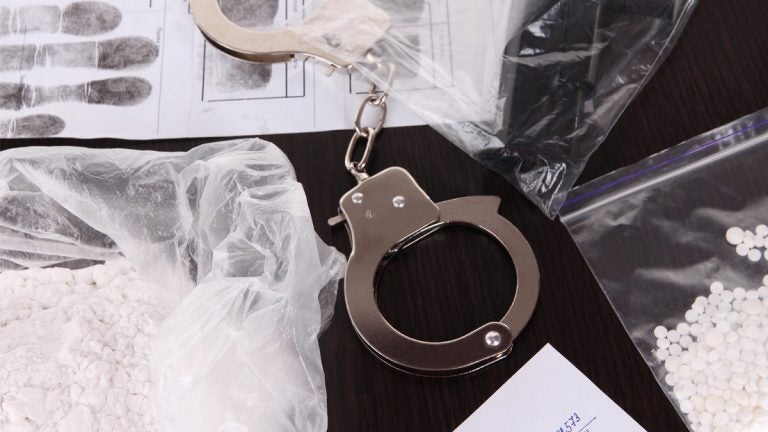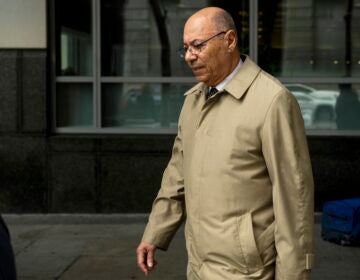DA: Philly police sat on 37,000 untested drug samples, prosecutions in ‘crisis’ mode
The police lab can’t afford overtime anymore, per a memo from the DA’s office. It may cause the city to prosecute fewer low-level drug possession cases.

The police lab can’t afford overtime anymore, per a memo from the DA’s office. It may cause the city to prosecute fewer low-level drug possession cases. (ShutterStock)
Updated 11 a.m.
Philadelphia law enforcement is drowning in a backlog of tens of thousands of untested drug samples linked to narcotics arrests — a “crisis” that has likely delayed or derailed a sizable number of drug cases, according to an emergency memo circulated by the Philadelphia District Attorney.
The internal memo, obtained by WHYY, shows that DA Larry Krasner’s office has put in place an “emergency protocol” to suspend the automatic testing of new narcotics samples for low-level drug cases. The change went into effect at the start of the month.
The decision to suspend forensic testing of samples could reduce the number of low-level drug cases the district attorney prosecutes each year.
After police make a narcotics arrest, drug samples must be sent to the PPD’s forensics lab for examination if the city hopes to ever prosecute the case, said Tom Ferrant, a local defense attorney.
“The court needs the test to prove beyond a reasonable doubt that what they were in possession of is the scheduled drug they’re being charged with,” Ferrant said. “Without that, the case is done.”
Officials have known for well over a year that the PPD’s Office of Forensic Science, located at 8th and Poplar streets, couldn’t handle a workload that has grown as the city battles a fierce opioid crisis, along with other drug problems. But the untested samples now number more than 37,000, according to the memo.
Although Krasner’s office notes it has tabled about 90% of the backlog through clerical work and other tweaks, the office continues to receive about 2,000 new submissions tied to narcotics arrests each month. The lab’s staffing can only handle about 1,250 cases per month, the memo states.
“In order to complete all incoming jobs, OFS would have to double its capacity,” the memo, which was circulated inside the DAO two weeks ago, concludes. “Action must be taken now to alleviate the crisis.”
The emergency protocol also indicates that the police forensic lab had previously relied on funding from civil asset forfeiture proceeds to cover roughly $1 million in overtime that aided additional lab testing. That funding is now gone.
Forfeiture revenue was controversially extracted from cash and other property taken off criminal suspects prior to a conviction. Krasner, elected on a progressive agenda, has sharply reduced the use of asset forfeiture, following public backlash and legislative reforms.
But even before Krasner took office, much of the district attorney’s remaining forfeiture revenues were frozen by a lawsuit over abuse of this legal mechanism.
“That source of funding no longer exists,” the DA memo states, referring to forfeiture revenue. “The City has not allocated additional funding to replace it.”
The document goes on to further blame the rise of fentanyl for spiking the police chemistry lab’s workload. Unlike other narcotics, the synthetic opioid cannot be reliably field-tested, according to the memo, and requires more intensive in-lab testing due to its sometimes complex chemical makeup.
Krasner raised concerns about the backlog interfering with his office’s drug prosecutions during City Council’s budget hearings in April. He said the problem predated his administration.
“The crime lab in Philadelphia, everyone concedes, does not have the ability to do all the testing, and when we have repeatedly asked that there be an outside vendor who would come in and do this testing, we haven’t gotten anywhere,” Krasner said, according to Council transcripts. “This has been a problem that’s been going now for about 18 months.”
Philadelphia Managing Director Brian Abernathy said the city has been working with Krasner for some time to resolve what he described as a difficult situation.
“We had been proposing numerous issues and it wasn’t until that Council testimony that we were able to break down some barriers,” Abernathy said. “The system works when we work as partners.”
Those fixes include $430,000 from the city’s general fund to cover overtime costs in the forensic lab. The new funds will allow the PPD to process approximately 2,600 more cases per year. That funding will continue until the number of synthetic narcotics cases go down, Abernathy said. The city also set aside about $200,000 for improvements to the lab facility that will expedite the caseload.
Abernathy said the DA’s office has also begun notifying the lab to cancel testing for cases where plea agreements have been reached.
In July, according to the memo, Krasner’s office initiated a review of the 37,000 drug test orders, determining that 33,400 could be canceled for various reasons in order to quickly reduce demand on city testing facilities. In some instances, drug cases had already pled out or been dismissed, but testing orders remained in a queue due to communication issues between the police-run lab and the prosecutor’s office.
In the memo, Krasner’s office said it “reprioritized” the remaining 3,600 major cases in order to “ensure the prosecution of critical cases.”
Going forward, Krasner –– who has pushed to effectively decriminalize drug possession altogether –– will no longer require misdemeanor possession cases to be automatically tested without supervisory approval, the memo indicates.
The city has tentatively approved an unspecified amount of interim funding to cover overtime costs temporarily and expand OFS lab testing facilities.
Despite these efforts by the city and DA to resolve capacity issues, the problem is likely to linger. It is estimated that it will take upwards of two years to renovate lab space and train additional technicians. Contracting third-party lab testing companies would be cost-prohibitive, adding over $5.5 million annually to city ledgers, according to a letter from the Managing Director’s Office.
Without a long term solution, Ferrant, the defense attorney, said the city might jeopardize major drug prosecutions.
Said Ferrant of narcotic testing: “The only thing you have without it is ‘A guy was arrested with a bag of powder.’”
WHYY is your source for fact-based, in-depth journalism and information. As a nonprofit organization, we rely on financial support from readers like you. Please give today.





